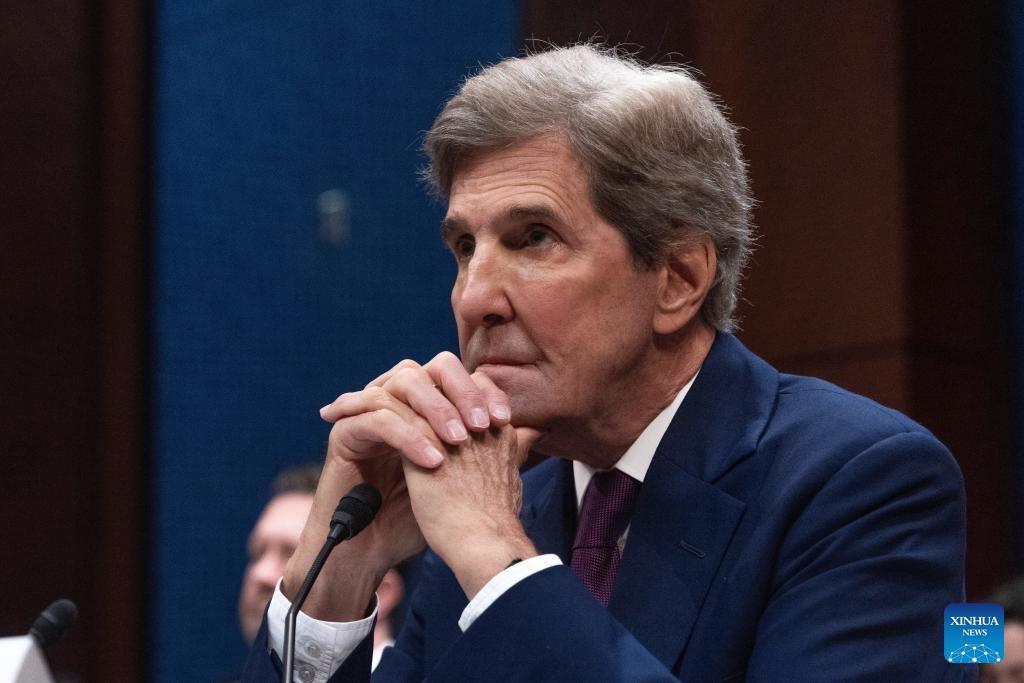 US Special Presidential Envoy for Climate John Kerry testifies during a hearing before the House Foreign Affairs Oversight and Accountability Subcommittee in Washington DC, the United States, on July 13, 2023. (PHOTO / XINHUA)
US Special Presidential Envoy for Climate John Kerry testifies during a hearing before the House Foreign Affairs Oversight and Accountability Subcommittee in Washington DC, the United States, on July 13, 2023. (PHOTO / XINHUA)
Experts have expressed high expectations for climate-themed technological cooperation between China and the United States, saying this will greatly reduce the cost of the world's efforts to cope with the global climate crisis.
They made the remarks on Monday at a news conference at the Beijing Hotel, where China's special envoy for climate change, Xie Zhenhua, and John Kerry, the US' special presidential envoy for climate, are holding talks.
Liu Yanhua, honorary director of China's national committee of experts on climate change, said there are solid foundations for Sino-US climate cooperation, as it's a consensus of the heads of state of the two nations
Kerry's four-day trip to China, which began on Sunday, is an important contact on climate issues between the world's two largest carbon emitters. It comes after China suspended climate talks with the US last year.
The suspension of the talks was one of eight countermeasures that China rolled out in response to the controversial visit by Nancy Pelosi, then speaker of the US House of Representatives, to the Taiwan region in August.
ALSO READ: John Kerry's visit: Clean energy, climate issues key on agenda
Liu Yanhua, honorary director of China's national committee of experts on climate change, said there are solid foundations for Sino-US climate cooperation, as it's a consensus of the heads of state of the two nations.
When President Xi Jinping met with US President Joe Biden ahead of the G20 summit in Bali, Indonesia, in November, "the two presidents emphasized that the two nations must beef up climate cooperation", said Liu, who is also a former vice-minister of science and technology.
The two countries have previously cooperated on climate change issues many times, and have made great contributions to global climate governance on all such occasions, he said, citing as an example the success of their joint efforts in promoting the landmark 2015 Paris Agreement on climate change.
China and the US laid the foundations for international support for the agreement.
Following President Xi's trip to the US in June 2013, then US president Barack Obama visited China in November 2014. During Obama's trip to China, the two presidents made public the China-US Joint Announcement on Climate Change, which said they "resolved to work closely together over the next year to address major impediments to reaching a successful global climate agreement in Paris".
ALSO READ: China, US set for 'in depth' talks on climate
Liu noted that four working groups set up by China and the US following a joint declaration in 2021 at the COP26 United Nations climate change conference in Glasgow, Scotland, were also part of the foundation for Sino-US climate cooperation.
The four groups were established to leverage the respective strengths of the two sides for climate cooperation in various sectors, and they have already done some work, he said.
As the world's largest carbon emitters and also the biggest producers of renewable energy, the two countries have much cooperation potential to tap into while promoting the global energy transition, Liu said.
Making full use of their respective strengths, China and the US can consider carrying out climate cooperation in a third-party country. Another potential cooperation area for the two sides is technologies for addressing climate change, he said.
Citing a report from the International Energy Agency in 2021, Liu said that in 2050, almost half the emission reductions will have to come from technologies that are now only at the demonstration or prototype phase, if the world wants to realize net-zero emissions by that time.
There are many problems to address as the world strives to tackle climate change. "No country can be immune from climate change. Neither can any single country address these problems by itself. Only via cooperation can we promote progress," he said.
ALSO READ: US climate envoy John Kerry to travel to China next week
Li Zheng, dean of the Institute of Climate Change and Sustainable Development at Tsinghua University, stressed the importance of Sino-US cooperation on solar panel production as part of global climate efforts, citing a study published in the journal Nature last year.
The study estimated that, between 2006 and 2020, based on historical installed capacities as well as input material and sales price data for solar panel modules in the United States, Germany and China — the world's three largest solar-deploying countries — the globalized solar supply chain saved the countries a combined $67 billion: $36 billion for China, $24 billion for the US and $7 billion for Germany.
The study found that if strong protectionist policies are implemented — limiting the free flow of goods, talent and capital going forward — solar panel costs will be higher by about 20 to 25 percent by 2030.
Li said: "If the technology develops fast, the cost will decrease rapidly. … In case of trade barriers rather than cooperation, the speed will be greatly reduced."


